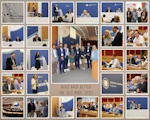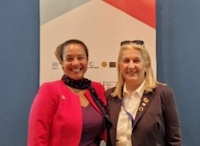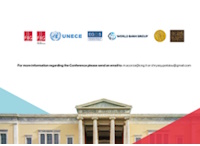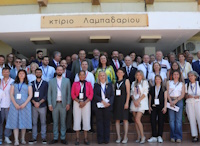News in 2025

|
Strategic Initiatives and Collaborative outcomes
FIG President Diane Dumashie and FIG VP Michalis
Kalogiannakis attend the Joint UNECE, FIG & World Bank Conference:
Advancing best practice to BUILD BACK BETTER THE
SELF-MADE CITIES in EUROPE:
18 -22 June 2025, Athens, Greece
The Joint UNECE, FIG, and World Bank Conference—titled “Build Back
Better the Self-Made Cities in Europe”—was convened in Athens, Greece,
from 18 to 22 June 2025. At the invitation of Professor
Chryssy A Potsiou (FIG Honorary President) and Nikos Zacharias, President of EGoS,
FIG President Diane Dumashie attended along with
FIG VP Michalis
Kalogiannakis.
This conference is an important milestone in the ongoing efforts to
address the formalization of informal constructions, enhancement of
geospatial ecosystems, and advancement of robust land tools and policies
across Europe.
Conference Strategic Purpose
The event was spearheaded by UNECE and the International Federation
of Surveyors (FIG), with critical support from the Hellenic Ministry of
Environment and Energy and the Hellenic Ministry of Digital Governance.
The focus was to promote international best practices for the
formalization of informal constructions, the improvement of geospatial
data ecosystems, and the development of innovative land administration
tools. Additionally, the event sought to reinforce partnerships among
key European and international organizations and professionals who shape
the future of urban land policy. Importantly this conference was
planned and organised within the Work Plan of FIG Commission
WG 9.4 jointly with UNECE WPLA.
Accordingly, the conference organisation was a collaboration that
included the UNECE Working Party on Land Administration (WPLA), Real
Estate Market Advisory Group (REM), European Group of Surveyors (EGoS),
FIG Commission 3 (Spatial Information Management), FIG Commission 9
(Valuation and Management of Real Estate), the World Bank, and the
National Technical University of Athens (NTUA).
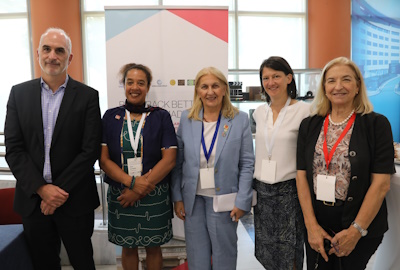
Organisation representatives left to right: Paul Prettitore (World
Bank), D Dumashie (FIG), Chryssy Potsiou (NTUA, Vice Chair UNECE WPLA
and Chair FIG WG 9.4) Maike Salize (WPLA), Prof Paloma Taltavull de la
Paz (Chair REM)
Significance of ‘Self- made cities’
This international forum forms a continuation of the vital research and
policy work initiated by the United Nations Economic Commission for
Europe and the International Federation of Surveyors in 2007. The focus
is on informal construction and the progressive formalization of
self-made cities—urban environments that have developed rapidly beyond
the reach of traditional cadastral systems and planning regulations.
Self-made cities often comprise a complex mixture of formal and informal
developments. Their challenges include a lack of clear property titling,
insufficient compliance with building regulations, and numerous
socio-economic issues such as limited access to services, increased
exposure to disaster risks, unregistered residents, and incomplete
cadastral and geospatial records. Frequently, these areas foster
informal property markets and contribute to an unregulated economy,
thereby complicating their integration into broader urban and national
strategies for sustainable development.
The conference also contributed to the ongoing work of the FIG Working
Group 9.4, which is dedicated to increasing transparency and resilience
in self-made cities through the formalization of informal development
and the systematic improvement of geospatial ecosystems.
Structure, Opening and Highlights of the Conference
Spanning five days, the conference was organised across multiple venues.
The primary sessions and technical workshops were held at the
School of
Rural, Surveying and Geoinformatics Engineering (NTUA), complemented by
a full day of high-level proceedings at the Ministry of Digital
Government. The final two days featured study tours on the Island of
Santorini, providing delegates with direct exposure to real-world urban
development scenarios and challenges.
The proceedings opened with addresses from distinguished academic
leaders, including Prof. Ioannis Chatzigeorgiou, Rector of NTUA, and
Prof. Maria Tsakiri, Dean of the School of Rural, Surveying &
Geoinformatics Engineering. Both speakers emphasized the critical role
of integrating Sustainable Development Goals (SDGs) into educational and
research agendas for the ultimate benefit of society. Their remarks
directly echoed the current FIG Vision (2023–2026), rooted in the UN
Agenda 2030.
Further, Pilar Verdejo Garcia (WPLA Chair) and
Maike Salize (Secretary,
UNECE WPLA) provided a comprehensive background on the activities and
strategic importance of the WPLA, highlighting its board
membership — which includes notable professionals such as FIG’s former
commission chair Hartmut Mueller and Helge Onsrud (the first WPLA
chair), both present in Athens, — and its significant contributions
through webinars and publications, all of which have direct relevance to
the FIG community.
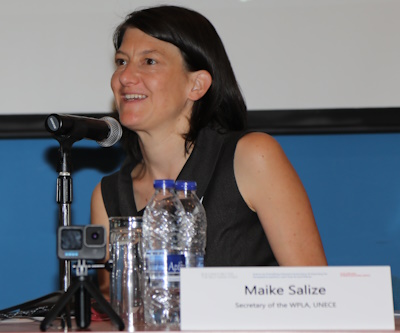
Maike Salize (Secretary, UNECE WPLA)
A particular focus was placed on two recent UNECE publications: the
original Informal settlement guidelines (2007*) and the 2019 COVID-19
Recovery Action Plan*. The latter publication was the subject of a FIG
conference paper in 2022. The two publications are co-authored by
Professor Chryssy Potsiou (Greece), Steven
Nystrom (USA) and Rik Wouters (The
Netherlands). These documents
underscore the urgency of addressing informal settlements in Europe,
where over 50 million people in 20 UNECE member states reside in such
areas. Housing affordability remains a pressing concern, particularly in
large, prosperous urban centres in Southern and Eastern Europe, where
rising costs have outpaced household incomes.
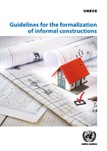 |
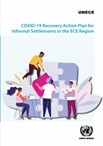 |
| UNECE Guidelines relevant to Informal
constructions |
COVID-19 Recovery Action Plan for
Informal Settlements in the ECE Region |
Paul Prettitore from the World Bank (Europe and Central Asia region)
outlined the Bank’s strategic approach to land administration in Europe
region, underlining the essential role of professional networks in
operationalizing effective land governance and management.
Nikos Zacharias, President of EGoS, affirmed the relevance of EGoS’s
work plan to the conference’s objectives, further reinforcing the value
of strong institutional partnerships.
FIG President Diane Dumashie delivered a keynote on the profession’s
contribution to “Building Back Better” in alignment with the FIG Work
Plan. She stressed the need to bridge the gap between policy and
practical implementation, maintaining public trust through adherence to
high ethical standards, and to keep our professional curiosity alive to
continuously build our capacity that in turn is essential for
sustainable land management.
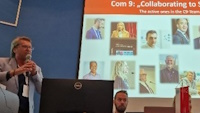 |
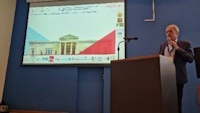 |
| Peter Ache Chair (FIG C9/ DVW) |
Hartmut Muller (Board ENECE WPLA) |
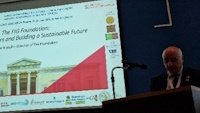 |
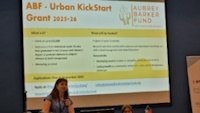 |
| Enrico Rispoli (FIG Foundation Director, CNG) |
Grazyna Wiejak-Roy (UWE) |
FIG Commissions 3 and 9 shaped the technical programme, linking
commission work plans to the conference themes. Notable contributors
included Hartmut Muller (on behalf of Chair Sagi Dalyot) and
Peter Ache,
focusing on SDGs and transparency in property markets, respectively.
In addition, there was good participation from the students and young
surveyors, from both the university but also beyond. This made the
opening remarks and presentation from Enrico Rispoli Director FIG
Foundation particularly impactful as he outlined the remarkable support
over the years that the FIG Foundation has given to Young Surveyors’ to
enable them to engage.
The Young surveyor thread was picked up again later in the
conference when Grazyna Wiejak-Roy (uwe.ac.uk)
announced the new Aubery Barker Fund research grant, supporting young
graduates from developing countries in Africa and Asia to address land
access and affordable housing challenges. Applications are due by 1
September 2025 (GMT). See:
ABF-UrbanKickstart
- Aubrey Barker Fund
The opening session concluded by Prof Chryssy Potsiou, (NTUA, WPLA Vice
Chair), giving background information about the previous research on the
topic, setting out the reason why the conference on informal
construction has been convened. convened, and setting the conference’s
mantra: “We cannot continue doing business as usual”. The rationale, is that “We are
here to discuss and search for fit for purpose solutions to Build back
better” and importantly that the communities of FIG and UNECE can
continue to progress this agenda, specifically through the joint FIG/UNECE
Working Group 9.4, chaired by Prof Chryssy Potsiou, as it will continue the research on Improving the
Self-Made Cities & Informal Settlements in the UNECE region.
High level briefings and cross government collaboration

Ministries Plenary held at the at the Ministry of Digital Government:
Chair C Potsiou and Rapporteur D Dumashie
Day two of the conference was dedicated to high-level discussions at the
Ministry of Digital Government, organized in close cooperation with the
Hellenic Ministry of Environment and Energy and the Hellenic Ministry of
Digital Governance. The session commenced with formal addresses from
several senior Greek officials:
- Stavros Papastavrou, Minister of Environment and Energy, Greece
- Dimitrios Papastergiou, Minister of Digital Governance, Greece
- Nikolaos Tagaras, Deputy Minister of Environment and Energy, Greece
- Nikolaos Tsafos, Deputy Minister of Environment and Energy, Greece
- Ioannis Androulakis, President of the Green Fund, Greece
- Georgios Stasinos, President of the Technical Chamber of Greece
Starting the rest of the day, Prof C Potsiou chaired the high-level
plenary session, with Dr D Dumashie as rapporteur. The day
included insightful presentations from a range of Hellenic Ministries
covering all sections of government. Covering topics such as
environment and energy, health, digital governance, economy and finance,
development, tourism, climate crisis and civil protection, and social
cohesion and family affairs.
A particularly notable initiative discussed was the development of a
unified digital database platform, designed to be accessible by all
government departments. This platform, set to launch in the coming
months, promises to enhance interdepartmental collaboration and ensure
that all state officials operate from a consistent data framework.
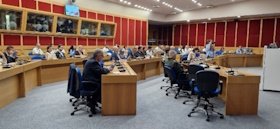 |
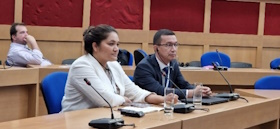 |
| Ministerial conference hall. |
Uzbekistan Land Commission Delegates |
Reflections and Knowledge Exchange
On the third day, delegates participated in parallel technical sessions
that explored a spectrum of themes, including cultural heritage,
geoinformatics, and tourism. FIG chairs, vice-chairs, and chair-elects
not only moderated sessions but also shared their expertise,
contributing to a rich exchange of knowledge and best practices.
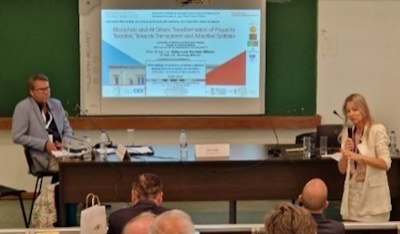
Commision 9 Chair Peter Ache and Chair Elect Malgorzata
Renigier-Bilozor presenting.
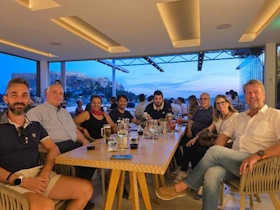 |
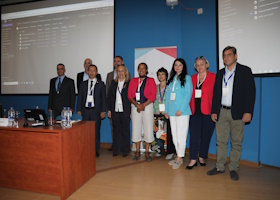 |
| Italian CNG delegates |
Speakers at Session 1: Formalization of Informal
Settlements: Progress and Challenge Chair D Dumashie (FIG)
Rapporteur Paul Prettitore (WB) |
With more than 150 delegates in attendance over three intensive days of
knowledge exchange, including 120 presentations by professionals,
academics, and government officials, this conference has contributed to
collaborative action in land administration, geospatial science, and
urban policy.
Closing Reflection: Building resilience
As the conference 3 days concluded there was a sense that resilience is
for Now; it must be embedded in current and future policy frameworks,
operational practices, and partnerships. It is recognized that robust
governance is only effective when driven by a commitment to societal
benefit and sustained public trust. The conference’s developed a mantra,
“It cannot be business as usual,” captured the spirit of innovation and
urgency that permeated all sessions—from opening remarks and plenaries
to technical workshops and high-level briefings.
Looking forward, the joint FIG/UNECE Working Group that will continue to
advance research and policy development for improving the quality and
resilience of self-made cities and informal settlements throughout the
UNECE region.
The proceedings and papers will be available for further reference
and will serve as a valuable resource for ongoing and future
initiatives.
Diane A Dumashie FIG President, July 2025
Further reading:
Conference Program and
flyer
Diane Dumashie Opening presentatation
UNECE PUBLICATIONS:
-
Guidelines for the formalization of informal constructions | UNECE
- COVID-19
Recovery Action Plan for Informal Settlements in the ECE Region | UNECE
FIG Paper presented 2022: COVID-19 Recovery Action Plan for Informal
Settlements in the ECE Region Goals, Targets and Actions (11654).























